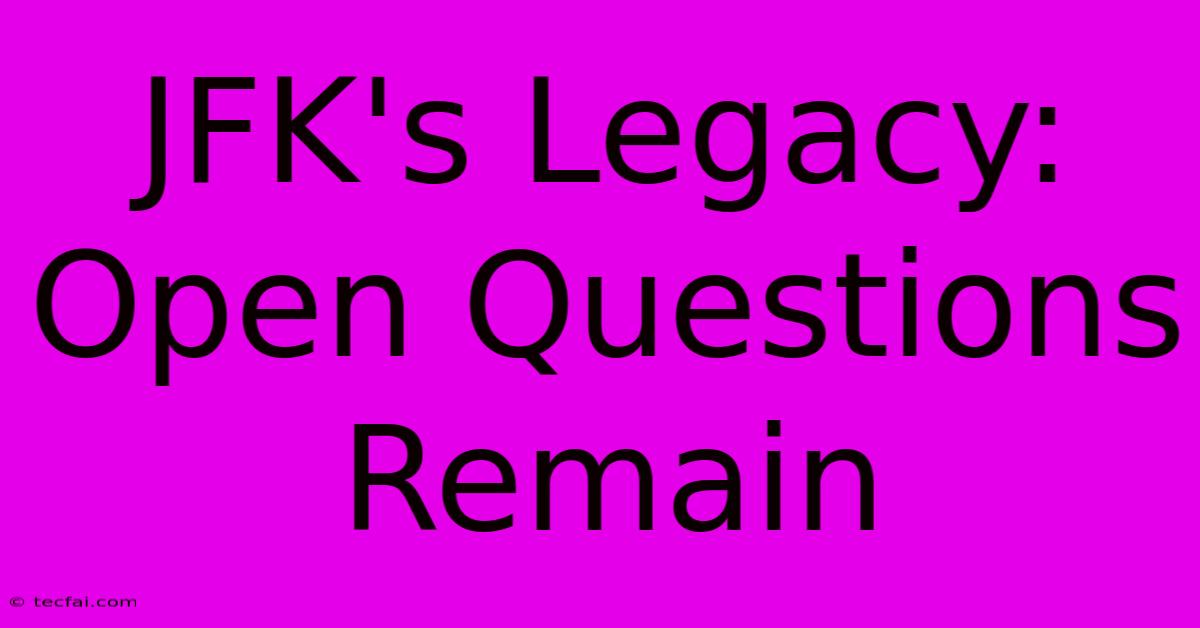JFK's Legacy: Open Questions Remain

Discover more detailed and exciting information on our website. Click the link below to start your adventure: Visit Best Website tecfai.com. Don't miss out!
Table of Contents
JFK's Legacy: Open Questions Remain
John F. Kennedy's presidency, though tragically cut short, continues to fascinate and inspire debate. His charisma, youthful energy, and ambitious vision captivated a nation, leaving behind a legacy that remains both celebrated and scrutinized. While his accomplishments are undeniable, several lingering questions continue to shape our understanding of his time in office and its lasting impact.
The Unfinished Revolution: Civil Rights and the Vietnam War
Kennedy's legacy is inextricably linked to the turbulent social and political landscape of the early 1960s. His administration's response to the burgeoning Civil Rights Movement remains a complex and often contradictory narrative. While he ultimately championed civil rights legislation, his actions were often hesitant and strategically calculated. Some argue that his commitment was genuine, evolving over time, while others point to a perceived lack of forceful leadership in the face of virulent opposition. The passage of the Civil Rights Act of 1964, signed into law after his assassination by Lyndon B. Johnson, stands as a testament to the unfinished revolution he initiated, a powerful symbol of his commitment that would ultimately be fulfilled posthumously.
His approach to the Vietnam War is another area of intense scrutiny. Kennedy inherited a growing American involvement in Vietnam, and while he initially escalated military advisors, the full extent of his long-term strategy remains a matter of speculation. Did he intend to significantly increase American military commitment? Would he have withdrawn troops as some historians suggest? The answers remain elusive, shaping the debate over his foreign policy decisions and their consequences for decades to come.
The Camelot Myth and its Critics
The image of Kennedy as a youthful, energetic, and idealistic leader—the so-called "Camelot" myth—permeates popular culture and continues to shape public perception. However, this romanticized portrayal is not without its critics. Historians have increasingly challenged the idealized narrative, highlighting his personal flaws and the complexities of his political maneuvering. His extramarital affairs, documented extensively in recent years, cast a shadow on his public image and raise questions about the nature of his leadership. Examining these complexities is crucial to attaining a balanced and nuanced understanding of his legacy.
The Assassination: Conspiracy Theories and Enduring Mysteries
The assassination of President Kennedy remains one of the most intensely debated events in American history. While the Warren Commission concluded that Lee Harvey Oswald acted alone, numerous conspiracy theories persist, fueling ongoing speculation and investigation. These theories, ranging from involvement by the Soviet Union to a clandestine domestic plot, continue to capture the public imagination. The enduring mystery surrounding his death contributes significantly to the complexities of his legacy, preventing a definitive closure and fueling continued speculation. The lack of complete transparency surrounding the event only exacerbates the uncertainty and leaves room for numerous interpretations.
A Lasting Impact: Space Exploration and the New Frontier
Despite the controversies, Kennedy's legacy extends beyond the controversies. His ambitious "New Frontier" program spurred significant advancements in space exploration, culminating in the commitment to landing a man on the moon before the end of the decade. This bold vision galvanized the nation and inspired a generation of scientists and engineers. The legacy of this initiative, extending beyond the moon landing itself, is a testament to his ability to inspire national ambition and forge a path towards a seemingly unattainable goal. This aspirational vision continues to resonate, representing a powerful facet of his enduring impact.
Conclusion: A Complex and Enduring Legacy
John F. Kennedy's presidency remains a subject of ongoing debate and reinterpretation. The open questions surrounding his actions, his character, and the circumstances of his death contribute to the enduring fascination with his life and times. Understanding his legacy requires grappling with the complexities of his achievements, his flaws, and the enduring mysteries that continue to shape our perception of this pivotal figure in American history. It is through this critical examination that we can truly appreciate the lasting impact of John F. Kennedy on American society and the world.

Thank you for visiting our website wich cover about JFK's Legacy: Open Questions Remain. We hope the information provided has been useful to you. Feel free to contact us if you have any questions or need further assistance. See you next time and dont miss to bookmark.
Featured Posts
-
F1 2026 New Team General Motors
Nov 23, 2024
-
Wicked Movies Departure From Stage
Nov 23, 2024
-
Lamars New Album A Surprise Drop
Nov 23, 2024
-
Malibu Earthquake 3 5 Magnitude Friday
Nov 23, 2024
-
Conor Mc Gregor Pays 250 K In Lawsuit
Nov 23, 2024
